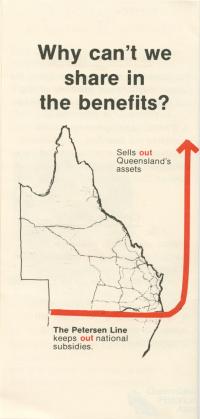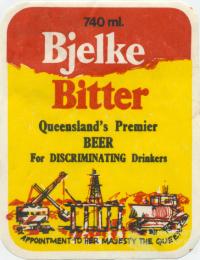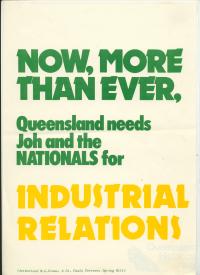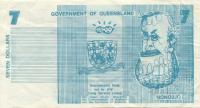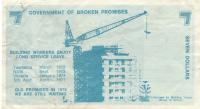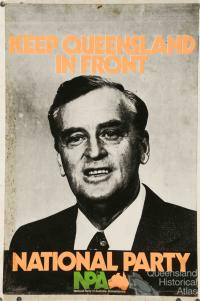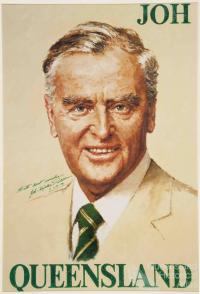- Home
- Quintessential Queensland
- Distinctiveness
- Perceptions
- Perceptions: how people understand the landscape
- From runs to closer settlement
- Geological survey of Queensland
- Mapping a new colony, 1860-80
- Mapping the Torres Strait: from TI to Magani Malu and Zenadh Kes
- Order in Paradise: a colonial gold field
- Queensland atlas, 1865
- Queensland mapping since 1900
- Queensland: the slogan state
- Rainforests of North Queensland
- Walkabout
- Queenslanders
- Queenslanders: people in the landscape
- Aboriginal heroes: episodes in the colonial landscape
- Australian South Sea Islanders
- Cane fields and solidarity in the multiethnic north
- Chinatowns
- Colonial immigration to Queensland
- Greek Cafés in the landscape of Queensland
- Hispanics and human rights in Queensland’s public spaces
- Italians in north Queensland
- Lebanese in rural Queensland
- Queensland clothing
- Queensland for ‘the best kind of population, primary producers’
- Too remote, too primitive and too expensive: Scandinavian settlers in colonial Queensland
- Distance
- Movement
- Movement: how people move through the landscape
- Air travel in Queensland
- Bicycling through Brisbane, 1896
- Cobb & Co
- Journey to Hayman Island, 1938
- Law and story-strings
- Mobile kids: children’s explorations of Cherbourg
- Movable heritage of North Queensland
- Passages to India: military linkages with Queensland
- The Queen in Queensland, 1954
- Transient Chinese in colonial Queensland
- Travelling times by rail
- Pathways
- Pathways: how things move through the landscape and where they are made
- Aboriginal dreaming paths and trading ways
- Chinese traders in the nineteenth century
- Introducing the cane toad
- Pituri bag
- Press and the media
- Radio in Queensland
- Red Cross Society and World War I in Queensland
- The telephone in Queensland
- Where did the trams go?
- ‘A little bit of love for me and a murder for my old man’: the Queensland Bush Book Club
- Movement
- Division
- Separation
- Separation: divisions in the landscape
- Asylums in the landscape
- Brisbane River
- Changing landscape of radicalism
- Civil government boundaries
- Convict Brisbane
- Dividing Queensland - Pauline Hanson’s One Nation Party
- High water mark: the shifting electoral landscape 2001-12
- Hospitals in the landscape
- Indigenous health
- Palm Island
- Secession movements
- Separate spheres: gender and dress codes
- Separating land, separating culture
- Stone walls do a prison make: law on the landscape
- The 1967 Referendum – the State comes together?
- Utopian communities
- Whiteness in the tropics
- Conflict
- Conflict: how people contest the landscape
- A tale of two elections – One Nation and political protest
- Battle of Brisbane – Australian masculinity under threat
- Dangerous spaces - youth politics in Brisbane, 1960s-70s
- Fortress Queensland 1942-45
- Grassy hills: colonial defence and coastal forts
- Great Shearers’ Strike of 1891
- Iwasaki project
- Johannes Bjelke-Petersen: straddling a barbed wire fence
- Mount Etna: Queensland's longest environmental conflict
- Native Police
- Skyrail Cairns (Research notes)
- Staunch but conservative – the trade union movement in Rockhampton
- The Chinese question
- Thomas Wentworth Wills and Cullin-la-ringo Station
- Separation
- Dreaming
- Imagination
- Imagination: how people have imagined Queensland
- Brisbane River and Moreton Bay: Thomas Welsby
- Changing views of the Glasshouse Mountains
- Imagining Queensland in film and television production
- Jacaranda
- Literary mapping of Brisbane in the 1990s
- Looking at Mount Coot-tha
- Mapping the Macqueen farm
- Mapping the mythic: Hugh Sawrey's ‘outback’
- People’s Republic of Woodford
- Poinsettia city: Brisbane’s flower
- The Pineapple Girl
- The writers of Tamborine Mountain
- Vance and Nettie Palmer
- Memory
- Memory: how people remember the landscape
- Anna Wickham: the memory of a moment
- Berajondo and Mill Point: remembering place and landscape
- Cemeteries in the landscape
- Landscapes of memory: Tjapukai Dance Theatre and Laura Festival
- Monuments and memory: T.J. Byrnes and T.J. Ryan
- Out where the dead towns lie
- Queensland in miniature: the Brisbane Exhibition
- Roadside ++++ memorials
- Shipwrecks as graves
- The Dame in the tropics: Nellie Melba
- Tinnenburra
- Vanished heritage
- War memorials
- Curiosity
- Curiosity: knowledge through the landscape
- A playground for science: Great Barrier Reef
- Duboisia hopwoodii: a colonial curiosity
- Great Artesian Basin: water from deeper down
- In search of Landsborough
- James Cook’s hundred days in Queensland
- Mutual curiosity – Aboriginal people and explorers
- Queensland Acclimatisation Society
- Queensland’s own sea monster: a curious tale of loss and regret
- St Lucia: degrees of landscape
- Townsville’s Mount St John Zoo
- Imagination
- Development
- Exploitation
- Transformation
- Transformation: how the landscape has changed and been modified
- Cultivation
- Empire and agribusiness: the Australian Mercantile Land and Finance Company
- Gold
- Kill, cure, or strangle: Atherton Tablelands
- National parks in Queensland
- Pastoralism 1860s–1915
- Prickly pear
- Repurchasing estates: the transformation of Durundur
- Soil
- Sugar
- Sunshine Coast
- The Brigalow
- Walter Reid Cultural Centre, Rockhampton: back again
- Survival
- Survival: how the landscape impacts on people
- Brisbane floods: 1893 to the summer of sorrow
- City of the Damned: how the media embraced the Brisbane floods
- Depression era
- Did Clem Jones save Brisbane from flood?
- Droughts and floods and rail
- Missions and reserves
- Queensland British Food Corporation
- Rockhampton’s great flood of 1918
- Station homesteads
- Tropical cyclones
- Wreck of the Quetta
- Pleasure
- Pleasure: how people enjoy the landscape
- Bushwalking in Queensland
- Cherbourg that’s my home: celebrating landscape through song
- Creating rural attractions
- Festivals
- Queer pleasure: masculinity, male homosexuality and public space
- Railway refreshment rooms
- Regional cinema
- Schoolies week: a festival of misrule
- The sporting landscape
- Visiting the Great Barrier Reef
By:
Rae Wear Queensland during Joh Bjelke-Petersen’s premiership (1968-87) appeared to confirm political scientist S.M. Lipset’s claim that ‘every country has a South’. During this time, the state was frequently portrayed as rural, backward, racist, populist, authoritarian and corrupt. It was often referred to as the Deep North and considered to be ‘different’ from the rest of Australia, mainly because Queenslanders kept electing governments led by Bjelke-Petersen. To those of a liberal, democratic disposition, life in Queensland had the characteristics that the Premier himself once attributed to running along a barbed wire fence with a foot on either side: ‘it doesn’t work and it’s not very comfortable’. Bjelke-Petersen, however, celebrated Queensland difference and treated outsiders with contempt.
Early years
Johannes Bjelke-Petersen was born of Danish parents in Dannevirke New Zealand in 1911 and came as a toddler to Bethany, the family farm near Kingaroy, where he spent the rest of his life. His later attitudes towards the landscape can be traced to his formative years on the farm. As well as farming, he branched out into contract harvesting and scrub clearing. He invented a system for clearing brigalow that involved dragging a chain between two tractors. He described the process:
We were clearing as many as 100 acres a day. Today you would see a huge area covered with brigalows so thick you could hardly walk through it, and tomorrow you would not see a tree standing upright … On a clear day you can hear the cracking and the snapping of the trees from a mile away.
Conflict
Throughout his political career, he revealed the pioneer settler’s attitude to the land: the country was there to be exploited. His premiership was punctuated by conflict over economic growth versus environmental preservation. In the late 1960s and early 1970s Bjelke-Petersen fought with opponents of oil exploration and drilling in the Great Barrier Reef and sand mining at Cooloola and Fraser Island. On these occasions his government was defeated but themes that were to characterise his premiership emerged: blindness to ministerial conflict of interest, intolerance of opposition and resentment of ‘Canberra’.
To Bjelke-Petersen, most opposition was illegitimate. John Sinclair, who led the fight against sand mining on Fraser Island had his job abolished. The Springbok rugby tour in 1971 and the re-opening of the Mary-Kathleen uranium mine in 1974 provoked further confrontation between demonstrators and police. Protesters found themselves subject to escalating levels of police violence. Street marches were banned. The conflict did not worry him. Rather, he found it ‘relaxing, great fun ... never ... stressful’.
Heavy handedness also characterised Bjelke-Petersen’s relations with unions. As a farmer, he saw unions as city based organisations dedicated to slowing productivity and eroding the work ethic. While still a backbencher he had opposed the forty hour week because he had worked much longer hours on the farm. During his premiership, workers faced increasingly draconian legislation. In 1985 striking electricity workers lost their jobs and superannuation. The following year Bjelke-Petersen’s National party won government in their own right, aided by the State’s malapportioned electoral system and the public’s perception of Queensland as a ‘boom’ state. Many economists disputed this claim and also pointed to Queensland’s comparatively low levels of expenditure on health, education, galleries and libraries.
‘Cranes on the skyline’
During Bjelke-Petersen’s premiership, mining, which was 85 per cent foreign owned, overtook the pastoral industry in export earning. Tourism also flourished. Both industries were allowed to develop with little impediment. To Bjelke-Petersen, ‘cranes on the skyline’ were a measure of the state’s prosperity. Progress was linked with destruction. In 1979 his government demolished the lovely old Belle Vue hotel in Brisbane’s parliament precinct. Opposition was so pronounced that the wreckers started work at midnight. The action drove a wedge between Bjelke-Petersen’s own National party and the coalition Liberals but did not deter him a few years later from ordering the demolition of the National Trust-listed Cloudland Ballroom in the early hours of the morning.
To many beyond the State’s borders, Queensland was unlike the rest of the country. On many indicators, it was indeed different: the majority of its population lived outside the capital city; its orientation was largely rural; there was very little manufacturing; education levels were lower; its children even had higher rates of dental cavities than those in other states because of government’s reluctance to artificially fluoridate the water. And Queenslanders kept re-electing Bjelke-Petersen.
Last days
On the back of his triumph in 1986 and with the encouragement of members of the ‘white shoe brigade’ of Gold Coast developers, Bjelke-Petersen decided to take Queensland-style government to Canberra. He embarked on the ‘Joh for PM’ campaign, a doomed enterprise that distracted him from events in Queensland where media revelations of police corruption could no longer be ignored. Deputy Premier Bill Gunn ordered an inquiry into ‘Alleged Illegal Activities and Associated Police Misconduct’ (the Fitzgerald Inquiry) with the result that Bjelke-Petersen’s popularity plummeted and his colleagues forced him from office. He died at Bethany in 2005.
References and Further reading (Note):
Rae Wear, Johannes Bjelke-Petersen: the Lord’s Premier, St Lucia, University of Queensland Press, 2002
References and Further reading (Note):
S.M. Lipset, Political man: the social bases of politics, New York, Doubleday, 1959
References and Further reading (Note):
Helen Cameron, Feeding the chooks: a selection of well-known sayings of former Queensland Premier, Sir Joh Bjelke-Petersen in his career of almost 41 years as a politician, Kingaroy, nd
‘The greatest thing that could happen in Queensland and the nation is when we get rid of all the media. Then we could live in peace and tranquility’.
Response to a question about possible leaks of government business during his use of a mobile telephone: ‘I always talk in a way they can’t understand!’
‘You don’t tell the frogs anything before you drain the swamp’.
‘Don’t put one foot on the sticky paper because pretty soon you will end up with two feet stuck.’
‘There are more ways of killing a cat than drowning it. Different occasions warrant different methods of annihilating a socialist government’.
‘You can’t sit on a fence, a barbed wire fence at that, and have one ear to the ground.’
‘I love it here with John. It is real pioneering stuff … carving a viable living out of virgin land. That is my one real regret about politics – I do not have enough time to spend with my family doing the things we like doing. It is my idea of relaxing- working on big machinery - or flying’.

